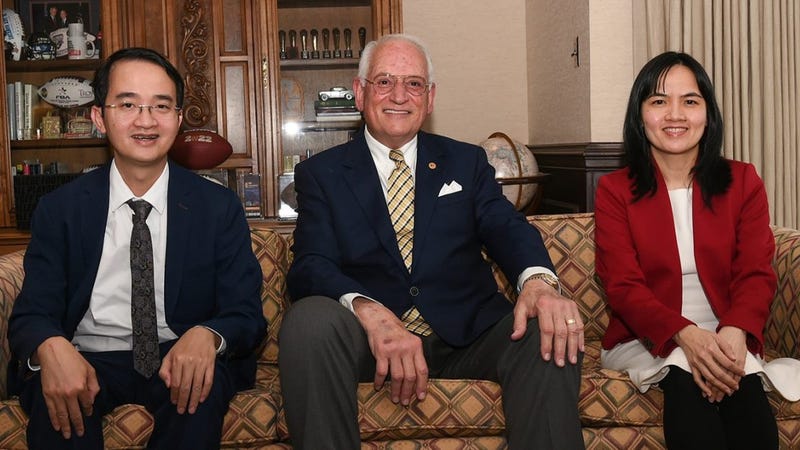
More than five decades ago, Jack Hawkins and Lê Công Có were on opposite sides of Vietnam’s killing fields.
The former adversaries are now university partners and advocates for international student programs. Hawkins, a former Marine, is chancellor of Troy University in Troy, Alabama and Có, a former member of the Viet Cong, founded Duy Tan University in Vietnam.
“We want to do everything we can not only to support this great country and to support our military men, women and those who have served,” Hawkins said of Troy University.
The documentary “Beyond a War,” tells how the former enemies forged a friendship.
Hawkins, a native of Alabama, grew up in the 1950s and 1960s during segregation and attended an all-white high school. He said he never made friends with people of other races before attending college.
After receiving his commission, Hawkins volunteered to deploy to Vietnam as a 23-year-old Marine second lieutenant in early 1968 and remained in-country until May 1969.
“I had three different platoons while I was in that country and still see many of those men on a regular basis because Troy Unversity has an annual military appreciation day,” he said.
Hawkins’ platoon was made up of 25 percent Black, 15 percent Hispanic, and 55-60 percent white with a common goal: They all wanted to survive.
“In war, you get beyond the lofty ideals of democracy and freedom and the cause you are fighting for,” he said. “It reduces to who is next to you. When you say all blood flows red, it is really true.”
Hawkins arrived at Troy in 1989 and began building relationships with universities worldwide, particularly in Asia. He was invited to Vietnam in 2002 and Troy soon began establishing academic programs in the country.
In 2017, Hawkins was invited to Vietnam by Có. Over dinner, the two began establishing both an educational partnership and friendship.
“I don’t know if we ever took shots at each other,” Hawkins said. “He is one of the most selfless men I’ve gotten to know through time.”
Có’s children decided to tell the men's story through the documentary.
“His family loves and respects him so much they really wanted to capture on film this story of these two old guys who partnered together, but it was really about their father. They really wanted to tell his story,” said Hawkins.
Originally meant for the Có’ family, the documentary made its was through Vietnamese censors and eventually to America.
“This documentary is really about reconciliation,” Hawkins said. “That reconciliation has resulted in a meaningful partnership that is saving lives every day.”
In the documentary, Có. detailed numerous B-52 bombings, including one that killed all six others who were in his tunnel. Hawkins remembered losing several Korean soldiers to roadside mines that also injured several Americans.
“I think when I left Vietnam in 1969 if I would have a hundred thoughts, likely the last one would have been I want to go back to Vietnam,” Hawkins said. “I think over the years, you become more aware about the value of relationships. You also recognize you can’t harbor resentment.”
Hawkins said he still sees resentment in some Vietnam veterans, and that is why the documentary holds value for some.
“When we came home, I don’t think any of us expected a grand celebration,” he said. “We just didn’t want to be criticized and most of us just wanted to get on with our lives.”
Hawkins said the American public has separated the war from the warrior.
Reach Julia LeDoux at Julia@connectingvets.com.
